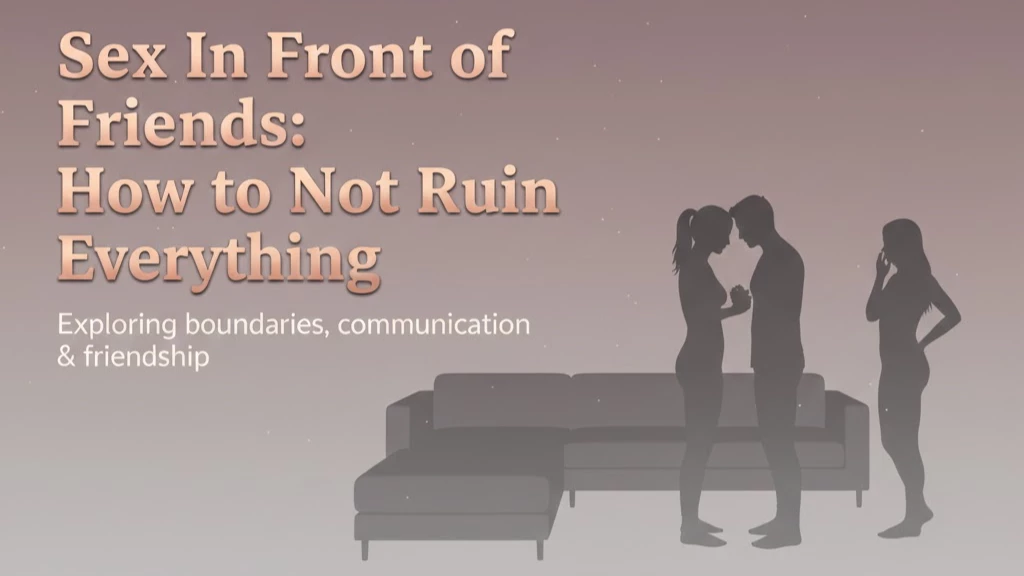Sex In Front of Friends: How to Not Ruin Everything
- 0 Collect
- 3 Like
- 168 Read
- Report


Keyword
So you're thinking about having sex while your friends watch, or maybe you're in a polyamorous household where this just sort of... happens. Whether it's at a sex party, a kink event, or just because your friend group has wildly different boundaries than most people, this is one of those things that sounds either incredibly hot or absolutely horrifying.
We're talking specifically about the weird, complicated dynamics when your social circle and your sex life overlap in ways that require emotional maturity and probably some therapy afterwards. How do people actually do this? What goes catastrophically wrong? And how do you avoid destroying your friendships while exploring your sexuality?
Why This Needs Way More Thought Than Sex With Strangers
The appeal depends entirely on who you are and what you're into. For some people in alternative lifestyles, having sex in front of friends is about radical vulnerability. Being sexually open with people you already care about platonically. For others, the thrill comes from being watched by people whose opinions actually matter to you, which hits different than strangers at a sex club.
Some polyamorous setups, particularly kitchen table polyamory (where all partners are friendly and hang out together), can lead to situations where sexual boundaries between friends become more fluid. In relationship anarchy or solo polyamory dynamics, traditional relationship rules don't apply, which creates situations where your friend group and your sexual partners overlap in confusing ways.
What makes it tricky is that sex in front of friends requires way more careful boundary-setting than sex with strangers because the stakes are higher. Mess up a hookup with a random person and you never see them again. Mess up sexually with your friend group and you've just made every future hangout awkward as hell, potentially fractured your entire social circle, and created drama that will haunt brunches for years.
You need to think through not just physical safety, but protecting relationships, managing emotions, and making sure everyone can still look each other in the eye at game night next Thursday.
Enthusiastic Consent in Friend Groups
Every single person involved or present needs to actively want this. Not implied consent, not "well they didn't say no," not "they seemed fine with it." Explicit, verbal, ongoing, freely-given agreement from everyone in the room.
Have conversations before anything happens. Talk explicitly about boundaries, what you're cool with, and what's off limits. Do this when everyone is sober, not horny, and able to think clearly about what they actually want versus what sounds hot after three drinks.
What specific acts are okay? Who can touch whom? Is this watching-only or is participation expected? What happens if someone gets weird feelings mid-scene? How will you handle it if someone catches feelings they didn't expect? These questions are important if you don't want to nuke your entire social circle.
Some people go as far as having relationship contracts or written agreements to nail down what everyone means, especially in ongoing polyamorous dynamics. Yeah, it sounds overly formal, but having things in writing prevents the "I thought you meant X but you meant Y" misunderstandings that destroy friendships.
Some Ground Rules To Start
Before anyone's clothes come off, establish ground rules everyone agrees to. Not suggestions, nope. You need actual rules that keep this from becoming a disaster you'll process in therapy for years.
Have safe words. You need a clear signal that means "stop everything right now" that everyone understands and respects. The traffic light system works: green means good, yellow means slow down or check in, red means stop immediately. Simple, clear, impossible to misunderstand.
Be explicit about participation levels. Is everyone engaging sexually with everyone, or are there specific pairings? Are some people observers only? Can observers become participants if everyone consents in the moment, or is that off the table? Be explicit about this and you can prevent situations where someone feels pressured to participate beyond their comfort level.
Define what privacy actually means. What happens in the room stays in the room. But what does that mean for your specific group? Can people talk about this with partners who weren't there? Can they reference it in casual conversation? Are photos or videos absolutely forbidden? Get specific because people have wildly different assumptions.
Anyone can leave anytime. No explanation needed, no drama, no justification required. Designate a private space where someone can go if they need out.
Figure out the substance rules. Alcohol and drugs make people do things they regret and have "wait, did I actually want that?" conversations the next day. Some groups stay completely sober, others allow moderate drinking but nothing beyond tipsy. Whatever you decide, make it explicit and actually enforce it.
Also think through potential emotional fallout before it happens. What if someone gets unexpectedly jealous? What if feelings develop? What if someone feels left out or ignored? Having plans for dealing with these situations means you're not scrambling to figure it out during an emotional crisis at 2 AM.
The Emotional Stuff
Physical safety rules are important, but emotional safety and psychological safety will also determine whether this strengthens or destroys your friendships.
Psychological safety means everyone feels safe saying "I'm uncomfortable," setting boundaries, or changing their mind without fear of judgment, rejection, or being labeled "not cool enough." Normalize that someone might feel differently once clothes come off than they did during the planning conversation three days ago.
Emotional safety requires you to acknowledge that feelings are unpredictable and messy. You might discover jealousy you didn't know you had. You might feel unexpectedly vulnerable. You might realize mid-experience that you're actually not okay with this even though you were sure you would be. Create space for these feelings without shame or "you said you were fine with it" accusations.
For some people, watching their partner have sex with a friend triggers compersion (the opposite of jealousy, where you feel joy at your partner's pleasure). For others, it triggers unexpected possessiveness or insecurity that feels completely out of character. Both reactions are valid, both are worth examining, but address them honestly instead of just stuffing them down.
Mutual respect is very important here. Respect someone's boundaries even when they change mid-experience. Respect someone's emotional reaction even if you don't understand it or find it inconvenient. Respect the complexity of navigating sexuality within friendships.
What Could Go Wrong
Sex in front of friends can implode spectacularly if handled poorly.
Friendship dynamics shift permanently. Once you've seen your friend in a sexual context, you can't unsee it. For some people this deepens intimacy and trust. For others it creates discomfort that makes the friendship feel fundamentally different forever. You genuinely can't predict which until it happens.
Jealousy comes out of nowhere. Even in polyamorous or open relationships, watching your partner be sexual with someone you see regularly at board game night can trigger feelings that watching them with a stranger wouldn't. The ongoing proximity means you can't just process your feelings privately. You have to deal with them while continuing to interact with everyone involved every week.
Someone crosses boundaries. Ignoring safe words, pushing for participation that wasn't agreed upon, or sharing details that were meant to be private. Boundary violations in friend groups are especially destructive because they affect multiple relationships at once and the whole social circle deals with the fallout.
Reality doesn't match expectations at all. What sounded incredibly hot in theory might feel uncomfortable, awkward, or disappointing in practice. Someone might realize mid-experience that they're not actually okay with this, which can lead to feelings of regret, embarrassment, or even violation if they felt pressured to continue.
Social dynamics fracture in weird ways. Your friend group splits into people who were involved and people who weren't, or drama from the sexual situation bleeds into other friendships. Suddenly everyone's taking sides and your weekly trivia night crew doesn't exist anymore.
Is It Worth It?
Before you even consider this, ask yourself hard questions. Are you doing this because you genuinely want to explore this dynamic, or because you feel pressure to seem sexually adventurous? Are you secure enough in your relationships (both romantic and platonic) to handle potential complications?
You can't fully predict how you'll feel until you're actually in the situation. Have honest conversations with yourself about your motivations, your actual boundaries (not the boundaries you wish you had), and whether you can handle complex emotions.
Consider starting way smaller if you're curious but unsure. Maybe attend a sex-positive event together without participating sexually. Maybe watch porn together as a group to gauge your comfort levels. Maybe have extensive conversations about boundaries and fantasies before anything physical happens and see if those conversations themselves reveal concerns.
Think about long-term implications honestly. If this goes badly, are you prepared to potentially lose these friendships? If it goes well, are you prepared for your social dynamics to permanently change? You can't explore this while keeping everything exactly as it was before. Something will shift.
When Being in Alternative Lifestyles Helps
For people who are embedded in alternative lifestyles like polyamory, ethical non-monogamy, or kink communities, sex in front of friends might be relatively normalized. These communities often have established norms around consent, boundaries, and emotional processing that make dealing with these situations more manageable.
Kitchen table polyamory is specifically built on the idea that all partners should be comfortable enough to sit around a kitchen table together, which inherently means openness about sexuality within friend groups. Relationship anarchy rejects traditional relationship hierarchies entirely, which creates fluidity between friendship and sexual relationships that feels natural instead of transgressive.
But even in these communities where everyone theoretically knows what they're doing, things can still go wrong. The difference is usually that people in established alternative lifestyle communities have frameworks for addressing problems, experience dealing with complex emotions, and social support from others who understand the dynamics.
For people outside these communities trying this as a one-off experiment or because it seems exciting, the risks are honestly higher because you don't have established frameworks for dealing with complications. You're building the plane while flying it. You can still do it, but be extra careful about communication and emotional preparation.
Sometimes the Fantasy Beats the Reality
Sex in front of friends can either deepen intimacy and create incredible experiences of vulnerability and trust, or destroy relationships and create lasting awkwardness. The determining factor is almost always how well you handle consent, communication, boundaries, and emotional complexity. Not how good the sex itself is.
If you're considering this, spend way more time on planning and boundary-setting than you think you need. Have multiple conversations. Create clear rules. Make sure everyone involved is making informed decisions from real genuine desire rather than pressure, curiosity they're not ready to act on, or trying to prove how sexually liberated they are.
And remember that you can always decide not to do this. The fantasy of sex in front of friends might be hotter than actual reality. There's absolutely no shame in exploring the idea through conversation and then deciding it's not worth the potential complications. Sometimes the sexiest thing you can do is recognize your actual boundaries and respect them, even when they're less adventurous than you wish they were.


